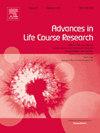Navigating threads of a young adult life-course: Tangled complexity in the education and work pathways of African university graduates
IF 3.4
2区 社会学
Q1 Medicine
引用次数: 0
Abstract
While educational attainment is increasing in sub-Saharan Africa, formal employment remains elusive. With this context in mind, this study delves into the young adult pathways undertaken by African graduate scholarship recipients post-university. Data from a longitudinal tracer survey was combined with qualitative interviews with graduates from six countries. Survey findings showed complexity with activities like employment, studying and entrepreneurship overlapping over time, with many combining working and/or studying and/or entrepreneurial activity. Qualitative analysis underlined this complexity, with education and work comprehensively entangled. The meaning of ‘employment’ covered various working world practices, often in education, which we call ‘finding a haven in education’ and profiting from various income streams while studying, which we call ‘multiple income streams and educational endeavours’. The interaction between education and work therefore problematises the concept of ‘transitions’, which assumes life-courses move from education into the world of work. We deploy the concepts ‘threads’ and ‘social navigation’ to illustrate this interaction, arguing that African graduates navigate their paths towards adulthood by weaving various thread-like opportunities into a temporarily stable livelihood knot or unravelling threads to create clear segments for income generation. They improvised an unconventional, middle-class African hustle, rather than following linear routes from education to work.
青年人生轨迹的导航:非洲大学毕业生教育和工作路径的错综复杂
虽然撒哈拉以南非洲的受教育程度正在提高,但正式就业仍然难以捉摸。考虑到这一背景,本研究深入研究了非洲研究生奖学金获得者在大学毕业后所采取的青年成人途径。来自纵向追踪调查的数据与来自六个国家的毕业生的定性访谈相结合。调查结果显示,就业、学习和创业等活动随着时间的推移而重叠,其中许多活动将工作和/或学习和/或创业活动结合起来。定性分析强调了这种复杂性,教育和工作全面纠缠在一起。“就业”的含义涵盖了工作世界的各种实践,通常在教育方面,我们称之为“在教育中找到避风港”,在学习的同时从各种收入来源中获利,我们称之为“多种收入来源和教育努力”。因此,教育和工作之间的相互作用提出了“过渡”的概念,它假设生活过程从教育转移到工作世界。我们使用“线索”和“社会导航”的概念来说明这种相互作用,认为非洲毕业生通过将各种类似线索的机会编织成一个暂时稳定的生计结,或解开线索,为创收创造明确的细分,来引导他们走向成年。他们即兴创作了一种非传统的非洲中产阶级的忙碌,而不是遵循从教育到工作的线性路线。
本文章由计算机程序翻译,如有差异,请以英文原文为准。
求助全文
约1分钟内获得全文
求助全文
来源期刊

Advances in Life Course Research
SOCIAL SCIENCES, INTERDISCIPLINARY-
CiteScore
6.10
自引率
2.90%
发文量
41
期刊介绍:
Advances in Life Course Research publishes articles dealing with various aspects of the human life course. Seeing life course research as an essentially interdisciplinary field of study, it invites and welcomes contributions from anthropology, biosocial science, demography, epidemiology and statistics, gerontology, economics, management and organisation science, policy studies, psychology, research methodology and sociology. Original empirical analyses, theoretical contributions, methodological studies and reviews accessible to a broad set of readers are welcome.
 求助内容:
求助内容: 应助结果提醒方式:
应助结果提醒方式:


